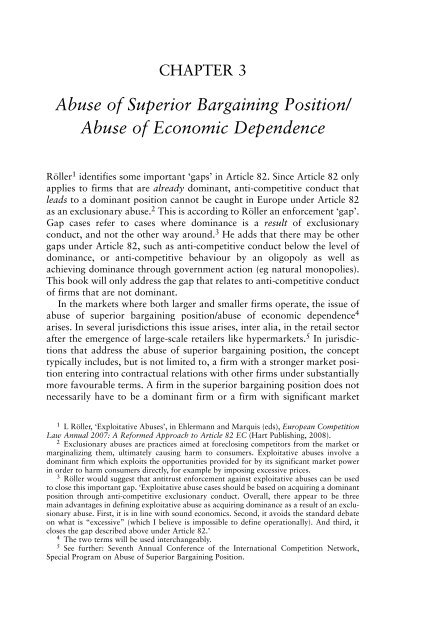Abuse of Economic Dependence - The Centre for European Policy ...
Abuse of Economic Dependence - The Centre for European Policy ...
Abuse of Economic Dependence - The Centre for European Policy ...
You also want an ePaper? Increase the reach of your titles
YUMPU automatically turns print PDFs into web optimized ePapers that Google loves.
CHAPTER 3<br />
<strong>Abuse</strong> <strong>of</strong> Superior Bargaining Position/<br />
<strong>Abuse</strong> <strong>of</strong> <strong>Economic</strong> <strong>Dependence</strong><br />
Röller 1 identifies some important ‘gaps’ in Article 82. Since Article 82 only<br />
applies to firms that are already dominant, anti-competitive conduct that<br />
leads to a dominant position cannot be caught in Europe under Article 82<br />
as an exclusionary abuse. 2 This is according to Röller an en<strong>for</strong>cement ‘gap’.<br />
Gap cases refer to cases where dominance is a result <strong>of</strong> exclusionary<br />
conduct, and not the other way around. 3 He adds that there may be other<br />
gaps under Article 82, such as anti-competitive conduct below the level <strong>of</strong><br />
dominance, or anti-competitive behaviour by an oligopoly as well as<br />
achieving dominance through government action (eg natural monopolies).<br />
This book will only address the gap that relates to anti-competitive conduct<br />
<strong>of</strong> firms that are not dominant.<br />
In the markets where both larger and smaller firms operate, the issue <strong>of</strong><br />
abuse <strong>of</strong> superior bargaining position/abuse <strong>of</strong> economic dependence 4<br />
arises. In several jurisdictions this issue arises, inter alia, in the retail sector<br />
after the emergence <strong>of</strong> large-scale retailers like hypermarkets. 5 In jurisdictions<br />
that address the abuse <strong>of</strong> superior bargaining position, the concept<br />
typically includes, but is not limited to, a firm with a stronger market position<br />
entering into contractual relations with other firms under substantially<br />
more favourable terms. A firm in the superior bargaining position does not<br />
necessarily have to be a dominant firm or a firm with significant market<br />
1 L Röller, ‘Exploitative <strong>Abuse</strong>s’, in Ehlermann and Marquis (eds), <strong>European</strong> Competition<br />
Law Annual 2007: A Re<strong>for</strong>med Approach to Article 82 EC (Hart Publishing, 2008).<br />
2 Exclusionary abuses are practices aimed at <strong>for</strong>eclosing competitors from the market or<br />
marginalizing them, ultimately causing harm to consumers. Exploitative abuses involve a<br />
dominant firm which exploits the opportunities provided <strong>for</strong> by its significant market power<br />
in order to harm consumers directly, <strong>for</strong> example by imposing excessive prices.<br />
3 Röller would suggest that antitrust en<strong>for</strong>cement against exploitative abuses can be used<br />
to close this important gap. ‘Exploitative abuse cases should be based on acquiring a dominant<br />
position through anti-competitive exclusionary conduct. Overall, there appear to be three<br />
main advantages in defining exploitative abuse as acquiring dominance as a result <strong>of</strong> an exclusionary<br />
abuse. First, it is in line with sound economics. Second, it avoids the standard debate<br />
on what is “excessive” (which I believe is impossible to define operationally). And third, it<br />
closes the gap described above under Article 82.’<br />
4 <strong>The</strong> two terms will be used interchangeably.<br />
5 See further: Seventh Annual Conference <strong>of</strong> the International Competition Network,<br />
Special Program on <strong>Abuse</strong> <strong>of</strong> Superior Bargaining Position.


